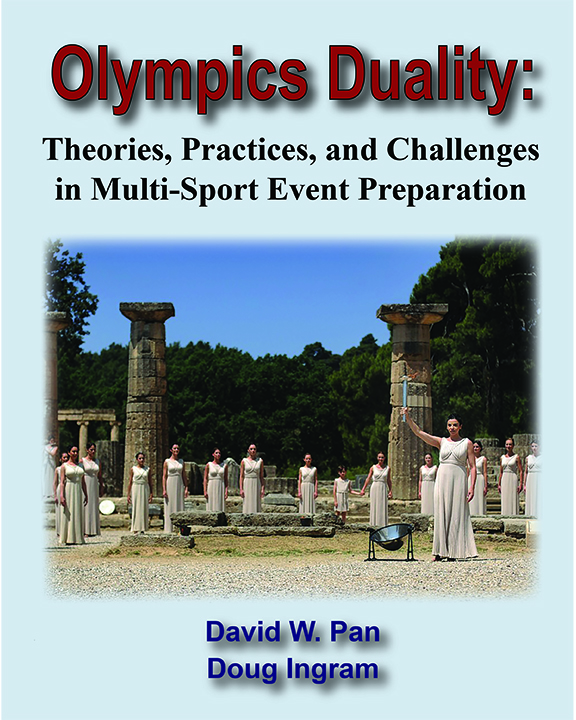Academic, Professional, Technical, Trade, Research Books & Journals
americanpress@flash.net • 617-247-0022 • 75 State Street #100 • Boston, MA 02109
Olympics Duality:
Theories, Practices, and Challenges in Multi-Sport Event Preparationby DAVID W. PAN AND DOUG INGRAM
2019, 390 full color pages
ISBN 978-0-89641-590-4
$91.95 (Includes shipping)
Olympics Duality: Theories, Practices, and Challenges in Multi-Sport Event Preparation, is written to inspire people with requisite knowledge in sport management and career/life guidance to expand our humanity dimensions through the development of leadership and organization skills in sport participation.
It is a must-read, de-mythicizing, resourceful textbook for anyone who wants to be part of a top sport competition, who is or inspired to elect a career in sport management, and/or for student-athletes who need the knowledge in preparation for either physical competition or personal services at a higher level of competition such as Olympic Games, Paralympic Games, Olympic Youth Games, World University Students Games (i.e., Universiade), continental games (e.g., All-African Games, Asian Games, Pan American Games, etc.), or similar ones (e.g., Islamic Solidarity Games, Central American and Caribbean Games, etc.). The book is suitable for students at both graduate and upper levels of sport management programs to develop competencies in the common professional component (CPC) topic areas as suggested by the COSMA accreditation principles.
A tiny difference at top sport competitions in front of the public often prompts a question of what should have been done differently to make it better by sport managers behind the scene. This is because the fundamental paradigms of high performance have been shifted from a predominant individual endeavor to a collective team effort in supporting individuals’ opportunities at top competitions as described in this book..
Olympics Duality is among very few related books, but is the first one that has integrated an array of theories, practices, and challenges together for a multi-sport event preparation and organization from a participating delegation’s perspective. This book has also proposed the attempts and opportunities for technological adoptions such as Artificial Intelligence (AI), Machine Learning, etc. for the improvement of management efficiency. This book can serve as an open-source environment in which numerous types of e-platforms can be integrated to simplify the preparation process and keep a multi-sport event such as Olympic Games sustainable with a minimal and recoverable ecological impact.
This book serves a tool for preparing, planning, coordinating, and managing the cycles of Olympic, Continental, regional, or national Games; however, this model of guidelines is by no means etched in stone. Each chapter will start with Learning Objectives, Key Words, Introduction, and a sample timeline along with the main content and conclude with Policy and Regulations as references and guidelines, Practical Applications, Summary of Learning Objectives, Caveats and Vignettes, and Chapter Review.
CONTENTS
Chapter 1: The Olympic Games
Chapter 2—Financial Resources
Chapter 3—Accreditation and Delegation
Chapter 4—Sport Entries
Chapter 5—Medical
Chapter 6—Travel and Transportation
Chapter 7—Accommodations
Chapter 8—Apparel, Equipment and Related Items
Chapter 9—National Olympic Committee (NOC) Logistics
Chapter 10—Media and Communication
Chapter 11—Ticketing
Chapter 12—Marketing
Chapter 13—Pre-Games Administration
Chapter 14—Games Time Administration
Epilogue
Appendices
Appendix A: Timeline Sample in PyeongChang-2018 Accreditation Manual
Appendix B: Accreditation Sample Chart: PyeongChang-2018-Accreditation Manual
Appendix C: Olympic Chart Rule 38 Calculation
Appendix D: Athletes / Officials Contract
Appendix E: Sample NOC Medical Assessment Questionnaire
Appendix F: NOC Drug Testing Information
Appendix G: NOC Procedures for Positive Drug Testing
Appendix H: Sample Agreement for NOCs Local Marketing/Sponsorship Programs
Appendix I: Information Gathering
Appendix J: Sample Games Evaluation Questionnaire
Appendix K: Games Deliverables
Appendix L: Event (Meet/Competition) Organization Guidelines
Appendix M: Sport Event Planning Checklist
Appendix N: GlossaryABOUT THE AUTHORS
Doug Ingram was an executive of United States Olympic Committee (USOC) in numerous roles for decades and currently is a consultant/educator on sport management, sport organization, and leadership development. David Pan is an educator/life-time learner of sport business in higher education. Both were competitive athletes and coaches with a common belief in the nature of Olympics Duality: i.e., sport participation should go beyond the prowess of competition at Olympics; the Olympic motto of Citius, Altius, Fortius (faster, higher, stronger) and the experience and skills learned from participating in the process should be adopted for a high cause of humanities in the entire life of participants.